|
|
|
Sort Order |
|
|
|
Items / Page
|
|
|
|
|
|
|
| Srl | Item |
| 1 |
ID:
079946
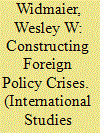

|
|
|
|
|
| Publication |
2007.
|
| Summary/Abstract |
Over the past century, crises have often driven shifts in U.S. foreign policy, as a liberal tradition has been permissive of varying tendencies to isolationism, pragmatism, or a crusading internationalism. While materialist analyses emphasize the impacts of crises on the capabilities of state and societal agents, they obscure the role of agents in interpreting crises. In this paper, I therefore offer a constructivist analysis, stressing the role of presidential rhetoric in the construction of crises as events which legitimate shifts between variants of the American liberal tradition and definitions of the national interest. I specifically examine interpretations of the Cold War and War on Terror offered in the March 1947 Truman Doctrine speech and September 2001 Bush Doctrine speech. Truman and Bush each reinterpreted international challenges as pertaining to "ways of life," transforming security and partisan debates in ways that delegitimated isolationism. In sum, this analysis highlights the enduring traditions and mass understandings which can themselves constrain elite debates.
|
|
|
|
|
|
|
|
|
|
|
|
|
|
|
|
| 2 |
ID:
079947
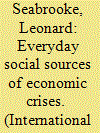

|
|
|
|
|
| Publication |
2007.
|
| Summary/Abstract |
Who drives domestic institutional change in the face of international economic crisis? For materialists, self-interested actors struggle for material gains during exogenously generated crises. For constructivists, norm entrepreneurs strategically construct how crises should be interpreted to justify certain institutional reforms. While both these approaches are analytically powerful, they suffer from an implicit view of legitimacy as established by elite command or proclamation during periods of uncertainty. This article adds an extra piece to the puzzle of which institutional reforms are selected in the construction of a crisis. It suggests that everyday discourses constructed by mass public agents, or non-elites, provide impulses for elite actors to select institutional reforms that will receive social legitimacy. The article re-examines the case of interwar Britain, arguing that a "legitimacy gap" between elite and mass understandings informed institutional experimentation during the 1920s and 1930s, fertilizing the eventual "Keynesian Revolution." In this way, this article seeks to show how the expressive practices and changing conventions of non-elite agents can shape institutional development. It also suggests that an "agent-centered constructivism" interested in explaining institutional change may be well served by taking into account popular as well as elite views
|
|
|
|
|
|
|
|
|
|
|
|
|
|
|
|
| 3 |
ID:
079944
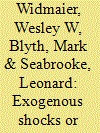

|
|
|
|
|
| Publication |
2007.
|
| Summary/Abstract |
This symposium addresses the role of wars and crises as mechanisms of international change. Over the past two decades, the international system has undergone a number of remarkable transformations, from the end of the Cold War to the emergence of an ongoing "War on Terror," and from the collapse of statist development models to the emergence of a contested-if evolving-neoliberal "Washington Consensus." This volatility exceeds any underlying shifts in economic structures or the distribution of capabilities, and raises important questions regarding the roles of agency, uncertainty, and ideas in advancing change. In this introduction we examine the role of wars and economic crises as socially constructed openings for change. We attempt three things: to critique materialist approaches in the security and political economy issue areas, to outline the distinctive contribution that an agent-centered constructivist understanding of such events offers, and to offer a framework for the study of such events, one which highlights an expanded range of elite-mass interactions.
|
|
|
|
|
|
|
|
|
|
|
|
|
|
|
|
| 4 |
ID:
079949
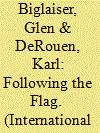

|
|
|
|
|
| Publication |
2007.
|
| Summary/Abstract |
In contrast to the 19th and early 20th centuries, the effects of security factors on foreign direct investment (FDI) have received limited interest in the post-Cold War era. Using panel data for 126 developing countries between 1966 and 2002, and controlling for macroeconomic conditions, economic reforms, and level of democratization, this essay tests the effects of "follow the flag" variables on U.S. FDI. Security factors can affect FDI in two stages: the initial decision over whether to invest and the second stage, which involves the amount invested. Our results indicate a selection effect and that follow the flag factors are influential both in the selection phase and in the main equation for U.S. investors. However, such results are not found for global investors, suggesting that positive links between economic and security goals only hold for U.S. firms
|
|
|
|
|
|
|
|
|
|
|
|
|
|
|
|
| 5 |
ID:
079955
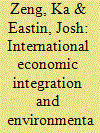

|
|
|
|
|
| Publication |
2007.
|
| Summary/Abstract |
This paper tests propositions advanced in previous theoretical literature about the impact of international economic integration via trade and investment on environmental protection with a case study of China. We hypothesize that instead of leading to additional environmental degradation, increased openness to trade and foreign investment results in an overall improvement in environmental quality by acting as a transmission belt for superior regulatory standards and environmental technology from China's key export markets. Additionally, pressure for enhanced environmental regulation and product standards from principal developed-world importers of Chinese goods may induce Chinese firms to self-regulate rather than attempting to reduce the cost of their exports by lowering environmental standards. Statistical analysis of the variation in environmental performance across China's regions from 1996 to 2004 lends support to this hypothesis, indicating that rather than leading regions to engage in a "race to the bottom" with the lowering of environmental standards, increased trade and investment encourages more stringent policy enforcement and compliance
|
|
|
|
|
|
|
|
|
|
|
|
|
|
|
|
| 6 |
ID:
079953
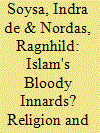

|
|
|
|
|
| Publication |
2007.
|
| Summary/Abstract |
Culturalists claim that political outcomes, such as respect for human rights, are deeply rooted in culture. Some have singled out Islam as particularly problematic. We assess whether Muslim societies suffer higher levels of political terror compared with others. Our results show that countries containing larger shares of Catholics, and those dominated by Catholics, fare the worst. The share of the population Muslim and Membership in the Organization of the Islamic Conference predicts lower levels of political terror. Claims about the uniqueness of Islam for accounting for political repression seem to be exaggerated. Consistent with the findings on religion and democracy, our results indicate that it is the Arab region, not religion that matters, but Latin America shows the largest impact. Substantively, political and economic factors matter a whole lot more than do the variables on religion. This is good news for policy that seeks to end the scourge of political repression.
|
|
|
|
|
|
|
|
|
|
|
|
|
|
|
|
| 7 |
ID:
079952
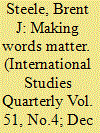

|
|
|
|
|
| Publication |
2007.
|
| Summary/Abstract |
Prominent communicative approaches to humanitarian crisis assume that international action is constrained by definitional disagreement. Yet interpretive agreement is not always enough to stimulate states into acting. Reflexive discourse is an alternative form of communicative action, and it occurs when international actors (state, nonstate, or suprastate) generate insecurity in powerful states, and stimulate these states into actions that they might initially be reluctant to pursue. By calling out the discrepancy between a targeted state's actions and its biographical narrative, reflexive discourse challenges a targeted state's self-identity and thus illuminates the interest such a state has in confronting certain crises. I use the American response to the recent Asian Tsunami, reviewing how then U.N. Undersecretary-General for Humanitarian Affairs Jan Egeland inadvertently used reflexive discourse by suggesting that Western nations were being "stingy" with their initial aid offers. This (in part) prompted the United States, albeit with much indignation, to increase by twenty times its aid to the affected areas. I then posit how a reflexive discourse strategy might have been used to persuade the United States into acting to confront the genocide in Darfur
|
|
|
|
|
|
|
|
|
|
|
|
|
|
|
|
| 8 |
ID:
079945
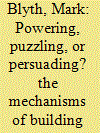

|
|
|
|
|
| Publication |
2007.
|
| Summary/Abstract |
This article offers an agent-centered constructivist analysis of institution building; that of the "first" New Deal of the National Recovery Administration. It argues that in moments of uncertainty generated by the failure of existing institutions, institutional choice becomes underdetermined by structure and open to attempts at creative and underdetermined inter-elite persuasion. What matters in such moments are the locally generated "crisis-defining" ideas at hand rather than simply the ostensible material positions of the actors in question. How this process took place in the U.S. is compared with both similar historical cases and alternative materialist models. An alternative model is developed, and in conclusion it is suggested why periods of deflation may be particularly open to inter-elite attempts at persuasion
|
|
|
|
|
|
|
|
|
|
|
|
|
|
|
|
| 9 |
ID:
079954
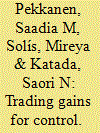

|
|
|
|
|
| Publication |
2007.
|
| Summary/Abstract |
The explosive proliferation of trade forums poses fundamental questions about why states forum-shop as they pursue liberalization. We advance a novel argument linking the institutional design of international trade forums directly to domestic politics. If industrialized democratic states have to appease conflicting forces in the domestic political marketplace as economic liberalization proceeds apace, they should prioritize forums that allow them to exert greater control over the pace and scope of liberalization. This prioritization is influenced by a tradeoff between two critical dimensions that combine differently across all international trade forums: the gains dimension, which determines the extent to which states can increase economic welfare based on the forum's rules; and the control dimension, which determines the extent to which they have power to set the forum's rules in line with their political concerns. We use the case of Japan to demonstrate the importance of the gains-control tradeoff.
|
|
|
|
|
|
|
|
|
|
|
|
|
|
|
|
| 10 |
ID:
079951


|
|
|
|
|
| Publication |
2007.
|
| Summary/Abstract |
There is growing evidence that states' formal ratification of international human rights treaties does not generate changes in states' domestic human rights practice. This article proposes to investigate a gap between states' formal commitments to international laws and their domestic practice by careful differentiation of mechanisms of social influence: coercion, persuasion, and acculturation. It is argued that each mechanism has profound implications for rates of ratification of international treaties and the scope of implementation. Two arguments drive the discussion. First, states often ratify international treaties in response to perceived or real social pressures to formally assimilate with other states in the global arena. Thus, they do not have intentions or capacities to implement them. Second, ratification of human rights agreements makes states vulnerable to social pressures of monitoring bodies, which generates different levels of policy compliance. I explore the empirical merits of this approach on the analysis of government compliance with the Convention on the Elimination of All Forms of Discrimination against Women provisions on violence against women in 26 post-Communist countries of Central and Eastern Europe and Central Asia
|
|
|
|
|
|
|
|
|
|
|
|
|
|
|
|
| 11 |
ID:
079948
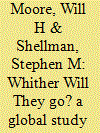

|
|
|
|
|
| Publication |
2007.
|
| Summary/Abstract |
common public perception in OECD countries suggests that refugees are mostly "economic migrants" in search of a better standard of living. Does the empirical record belie this belief? The authors explore that question within a rationalist approach using aggregate-level data that allow them to explore a variety of other covariates of the choice to seek refuge in one country relative to another. In addition to wages, they consider fear of persecution, culture, and the costs of relocation. The results are at odds with the "bogus refugees" image: the effect of average wages is mediated by proximity such that higher average wages are associated with fewer refugees, except among bordering countries. In addition, refugees seek asylum in neighboring countries, especially those at war with their own country or those experiencing a civil war. Those who seek refuge in countries other than their neighbors follow colonial ties
|
|
|
|
|
|
|
|
|
|
|
|
|
|
|
|
| 12 |
ID:
079950
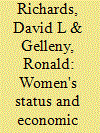

|
|
|
|
|
| Publication |
2007.
|
| Summary/Abstract |
This article examines the relationship between women's status and economic globalization. The expectations of both proponents and skeptics of globalization are discussed with regard to women's status, and a series of statistical examinations of this relationship are performed using data on 130 countries from 1982 to 2003. To control for the potential sensitivity of findings to the use of particular indicators of women's status, we use five indicators of women's status from two different data sources to represent the economic, political, and social spheres of women's status. As well, four indicators of economic globalization are used. We find that the relationship between economic globalization and women's status varies by type and era and, in the majority of instances, economic globalization is associated with improved women's status
|
|
|
|
|
|
|
|
|
|
|
|
|
|
|
|
|
|
|
|
|